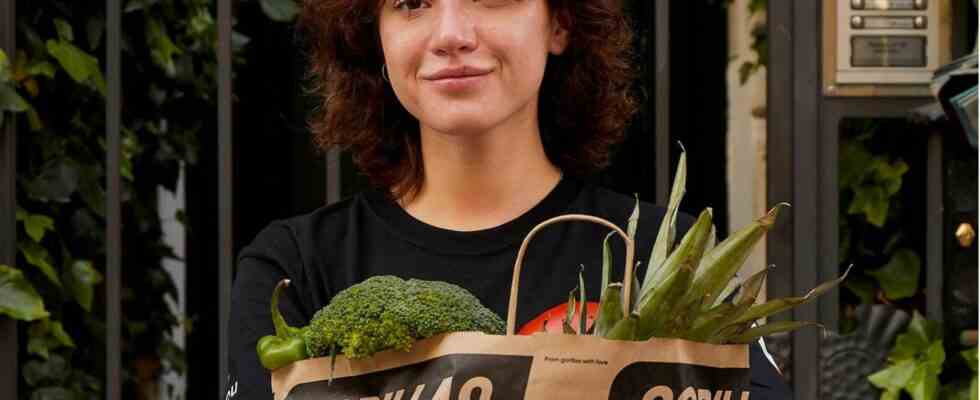It sounds so simple: with just one click we can order groceries to be delivered to our homes. The delivery takes place within a few minutes. And that from the sofa. What sounds like a perfect world comes with a hefty price tag. Are we willing to pay this?
A good two years ago, food activist and author Hendrik Haase was sitting at a friend’s house who really wanted to eat Kässpätzle. Good, he thought, then we’ll order from a restaurant. No, she said, there’s something better now. She clicked on her smartphone and grinned with delight. Ingredients will come in ten minutes, she said, then we’ll cook them ourselves, they taste a lot better. A revolution, thought Haase. There was now a delivery service that delivered faster than any delivery service before: Gorillas, the supermarket of the future.

Food activist and author Hendrik Haase sees a great danger in companies like gorillas
© Anika Mester
Haase was amazed at first glance: a concept was born that replaces going to the supermarket. The app contains a “digital shelf” that learns with our shopping behavior. If you open the app again after making a purchase, the algorithm suggests the foods that match your personal preferences. A system that is fed by user data and spits out exactly what the user wants. A sophisticated concept. Actually. In his book “Food Code”, Hendrik Haase writes about how we keep control over our food in the digital world. Because with delivery services like gorillas, he sees a great danger: We become “glass eaters”.
E-food as an opportunity for supermarkets
They are omnipresent on the streets of Berlin and Hamburg: courier drivers who deliver groceries by bike or scooter. The Gorillas company, founded in Berlin in 2020, is no longer the only provider that has made “food delivered in 10 minutes” its unique selling point. Getir, Flink, Volt or Dropp: the competition never sleeps.
So will normal supermarkets as we know them eventually disappear? In her “Food Report 2023”, futurologist Hanni Rützler writes that going to the stationary supermarket is still the norm, but the markets have to change. She writes: “The boom in e-food in particular has increased the visibility and acceptance of alternative shopping options to the supermarket.” Rützler sees this as an opportunity for the supermarkets. They have to get fit for the future in order to remain attractive for future generations.
So far, none of the e-food companies have been in the black, they are primarily looking for growth. Gorillas are also repeatedly criticized for poor working conditions. An ex-manager grabbed opposite “taz” to be aware that customer shipments come with a heavy price: “a modern form of slavery”.
Hendrik Haase agrees: For him, the drivers are just a “kind of bridging technology”: “For me, the riders are human gap fillers until enough data has been collected that autonomously driving delivery robots can be used, which already exist in the USA, for example are in action.” The data is the big sticking point in this story: “We need data for the type of delivery service,” says the food activist in an interview with the star. “In order for the groceries to be delivered so quickly, there must be warehouses right around the corner from our neighborhood, not at the other end of town. Unlike a shopping center, which has something for everyone, a micro-warehouse, on the other hand, has to know exactly what’s in the neighborhood eaten and ordered frequently.”
Robots that deliver food: is it all just a dream of the future? At the request of star At least gorillas don’t deny that robots could be used at some point. A spokeswoman only writes that “Gorillas sees itself as a rider-centric company”. All “technologies and data-based processes are used exclusively to improve the day-to-day work of the warehouse employees and riders and to optimally design processes.”
Gorillas knows exactly what is consumed where
How can this succeed? With the help of calculations. Algorithms that learn from the orders. They calculate what the customer likes based on beta, master, work and order data from the entire city and comparable districts. Gorillas also confirms this: The customer data is processed “using anonymous user IDs”. “We use these user IDs, for example, to improve the user experience of our customers as part of the recommendations on the homepage and in the search function of our app – a standard practice that is used equally by all e-commerce players.”
Hendrik Haase takes a critical view of the processing of the data: “Ideally, suppliers like gorillas then know exactly how many bottles of kombucha or veggie sausage are consumed in Kreuzberg or Ottensen,” explains Haase. “In a certain part of our life, we will go completely glass for such an app,” says Haase. “It can happen that you slip into certain filter bubbles. Thinking positively, you only ever get fresh food displayed because you like to cook fresh. But it also goes in the other direction: more and more fast food, more and more chips, more and more unhealthy things. It If you let this run unchecked, there is a danger that you will end up eating very one-sidedly.” Gorillas pack it differently. They want to help reduce food waste. “Our on-demand delivery promise makes it easier for consumers to only buy what they need, when they need it,” the company writes when asked. But that would presuppose that the consumer already knew how to eat healthily.
The digital dining society
In Berlin, meanwhile, large advertising posters are hanging all over the city districts, which say, for example, where milk powder for babies is most often bought, where pastries are ordered or where something as banal as green peppers is eaten. The company Gorillas advertises with the data analysis of the orders of their users. “I see it as total surveillance in the digital eating society. And that’s not even hidden by the company, but exploited as marketing,” says Haase.

In the end, the question remains whether we are willing to pay the price of large data collection. Are we ready to reveal a very intimate and vital part of our lives, our eating habits? And that’s just for saving us the trip to the supermarket.

